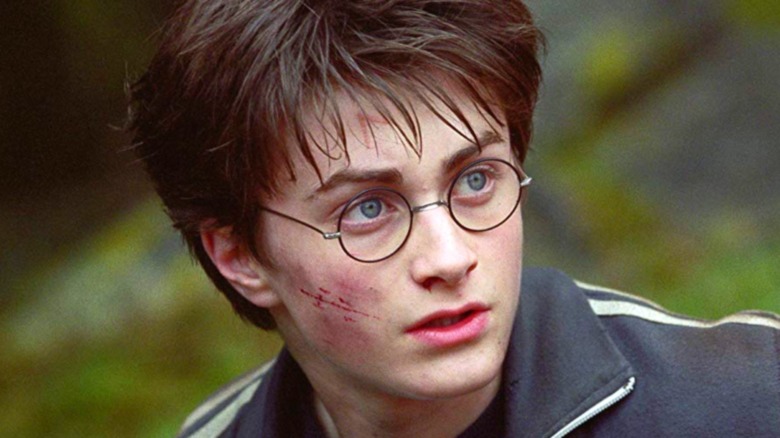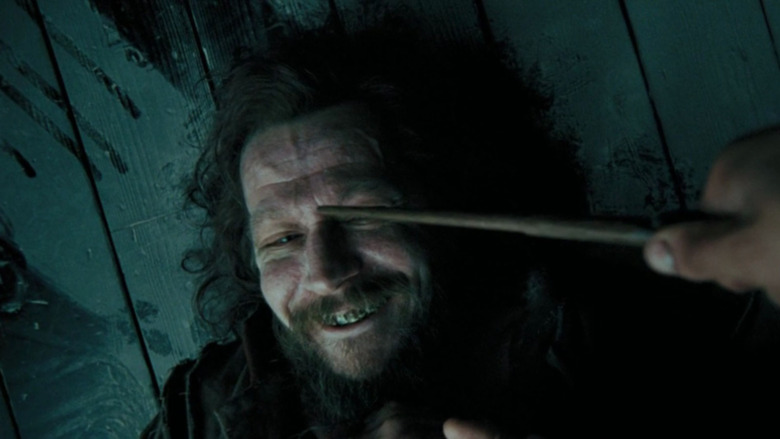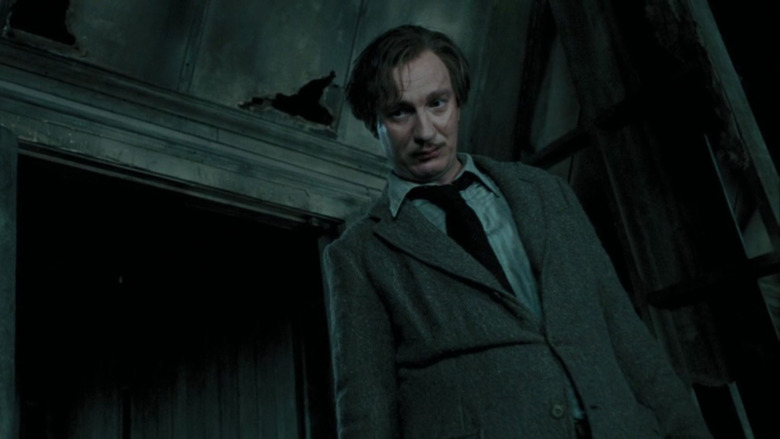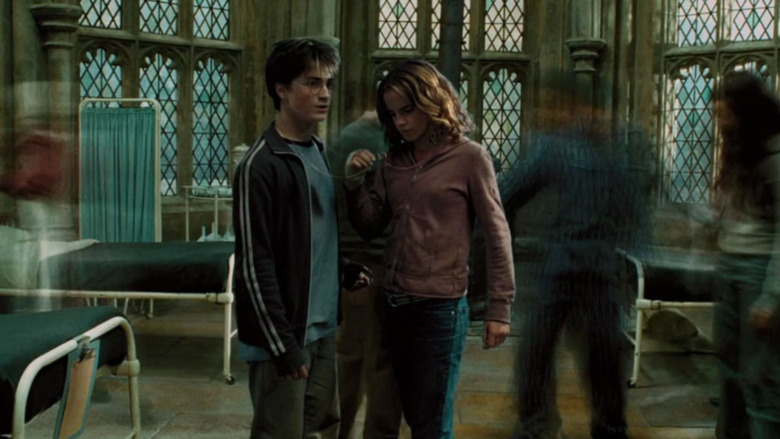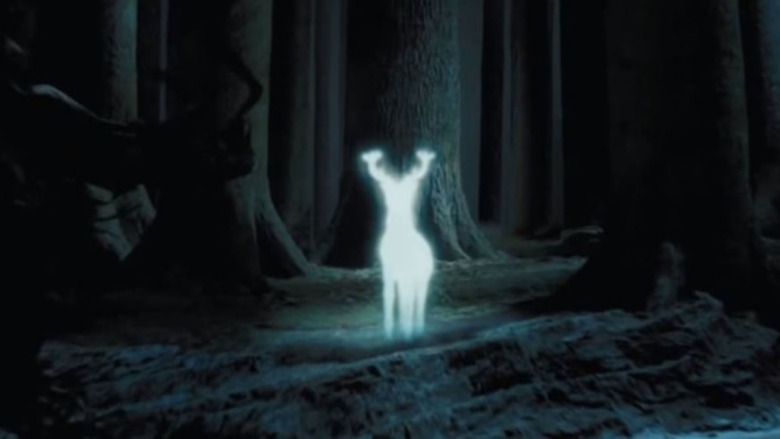The Ending Of Harry Potter And The Prisoner Of Azkaban Explained
Harry Potter and the Prisoner of Azkaban changed the game for Harry Potter fans. Not only was it the first movie not directed by Christopher Columbus, but the story — in both book and film form — introduced characters and mythology that would impact Harry's battle with Voldemort all the way through to the final installment. It's also very complicated, with Time-Turners, scenes from multiple perspectives, and big reveals that have fans frequently shifting their allegiances.
Prisoner of Azkaban seems to follow a few different plot threads: Sirius Black has escaped the wizard prison Azkaban, and everyone assumes he's out to kill Harry. Hogwarts also has a new Defense Against the Dark Arts teacher, Professor Lupin, and he is super weird about the moon. Hagrid's hippogriff, Buckbeak, is about to be executed for scratching Malfoy. Ron's pet rat Scabbers is missing, presumed eaten by Hermione's cat Crookshanks. And there's a big dog out there that may portend death. All these threads seem independent, but they converge at the Shrieking Shack, delivering an ending to Harry Potter and the Prisoner of Azkaban that provides deep commentary on the series' themes.
The Marauders are reunited at the end of Prisoner of Azkaban
As the action ramps up toward the ending of Harry Potter and the Prisoner of Azkaban, Scabbers reappears just in time for the Golden Trio to seemingly witness Buckbeak's execution. But then Scabbers escapes from Ron and hightails it for the Whomping Willow. Chasing Scabbers, the three find that the tree contains a secret passage to the Shrieking Shack, and, once there, they are confronted by Sirius Black. He turns out to be the dog that's been portending doom this whole time. Sirius is an unlicensed Animagus, and he's also apparently BFFs with Lupin. The Defense Against the Dark Arts prof finds the gang in the Shack and embraces Sirius as a long-lost chum. After a confusing 30 seconds or so for the three kids, the adults explain that Sirius was framed for the crimes against Harry's family. The person who actually snitched to Voldermort was Peter Pettigrew, aka unlicensed Animagus Wormtail, aka Scabbers the rat.
The kids learn that Lupin, Sirius, Peter, and Harry's dad James were all besties in school. When Lupin was attacked and turned into a werewolf as a teen, the other three became Animagi so that they could keep him company during his time of the month. The gang gave themselves nicknames based on what they transformed into: Moony (Lupin, werewolf) Wormtail (Peter, rat), Padfoot (Sirius, dog), and Prongs (James, stag).
David Thewlis didn't play it straight as Lupin in Harry Potter
There's some subtextual stuff going on beneath the surface of the Shrieking Shack scene at the end of Harry Potter and the Prisoner of Azkaban. Director Alfonso Cuarón told David Thewlis, who played Lupin, that his character was gay. "Alfonso Cuarón, in the rehearsals, without J.K. Rowling's knowledge, told me that [Lupin] was, in fact, gay," Thewlis said, per Entertainment Weekly. "So I'd been playing a part like a gay man for quite a long time. Until it turned out that I indeed got married to Tonks. I changed my whole performance after that. Just saw it as a phase he went through." Many fans picked up on the vibes, noting that Lupin and Sirius' reunion scene in the film seemed more like boyfriends reuniting, not best friends.
The maybe-boyfriends' touching reunion is short-lived, however, as Snape comes to the Shack with the intention of apprehending Sirius. After knocking Snape out, Harry convinces Sirius and Lupin to turn Peter over to the dementors rather than killing him outright. Unfortunately for them, it's a full moon. Lupin changes, Peter stuns Ron and escapes, and Sirius transforms into Padfoot in order to defend the kids from Moony. Harry and Sirius are swarmed by dementors, but they're saved by a spectral stag. Harry is convinced that the stag is his father.
Harry Potter and the Prisoner of Azkaban establishes the rules of time travel in the Wizarding World
After passing out, Harry wakes up in the Hospital Wing to the news that Sirius is about to receive the Dementor's Kiss — that is, have his soul sucked out. Unpleasant. Luckily, viewers find out Hermione has been bending the rules of space and time all year to attend extra classes. Hermione has a Time-Turner, which she can use to go back to before Buckbeak was executed, before Lupin transformed, and before the Dementors attacked Harry. For this last part of the film, we see the events of the day from a new perspective. Hiding from their past selves, Harry and Hermione free Buckbeak and rescue Sirius. It's all very Back to the Future Part 2.
This part of Harry Potter and the Prisoner of Azkaban frames the rules of time travel within the Harry Potter universe. It would appear that Harry Potter's time travel is a closed-loop, per Vulture. You can't change what's happened in the past because you already saw the effect of what you did in the past. In the gang's first encounter with Buckbeak's execution, we only hear the axe make contact with something. In the second go-round, we learn that it was the executioner plunging his axe into a tree stump, frustrated that he didn't get to kill something. And the stag that saved Harry and Sirius from the Dementors? It was Harry's Patronus.
In the ending of Harry Potter and the Prisoner of Azkaban, Harry learns more about his connection with his dad
Harry is excited to see his father in his second swing through time, convinced that it was James who saved Harry and Sirius from the Dementors. Eventually, he realizes he was the one who cast the Patronus charm: He saved himself.
At first, Harry is disappointed to not meet his father. But there's something sweet about the connection Harry didn't even know he shared with his dad, Prongs. Both have a stag as their Patronus, with James even being able to change into one as an Animagus. Harry's mother, Lily, has the Patronus of a doe. This symbolizes how the two belong together. It's also symbolic that the whole Potter family has prey animals as their Patroni. They aren't violent people, rather they are thrust into violent circumstances by the world. Many of Harry Potter's themes concern Harry's true nature and whether, among other qualities, Harry's scar brings him closer to Voldemort in ways that signify deep, possibly dangerous similarities. In the ending of Harry Potter and the Prisoner of Azkaban, Harry's Patronus underscores his ultimately gentle nature.
